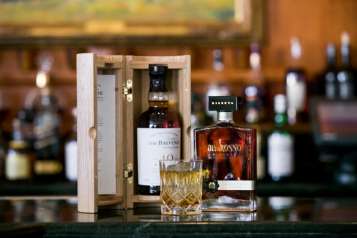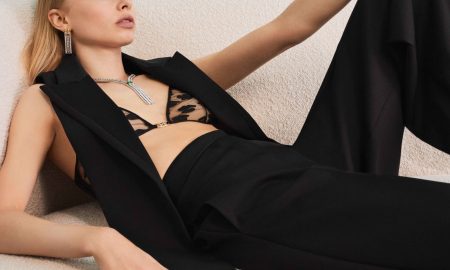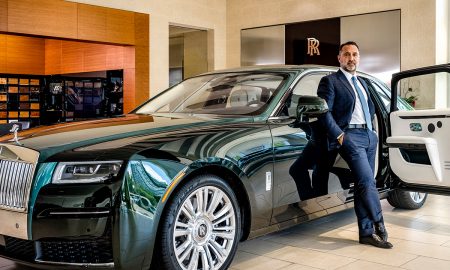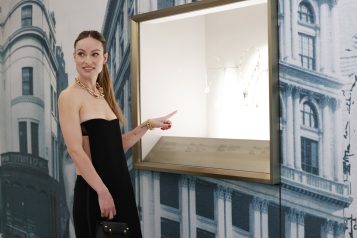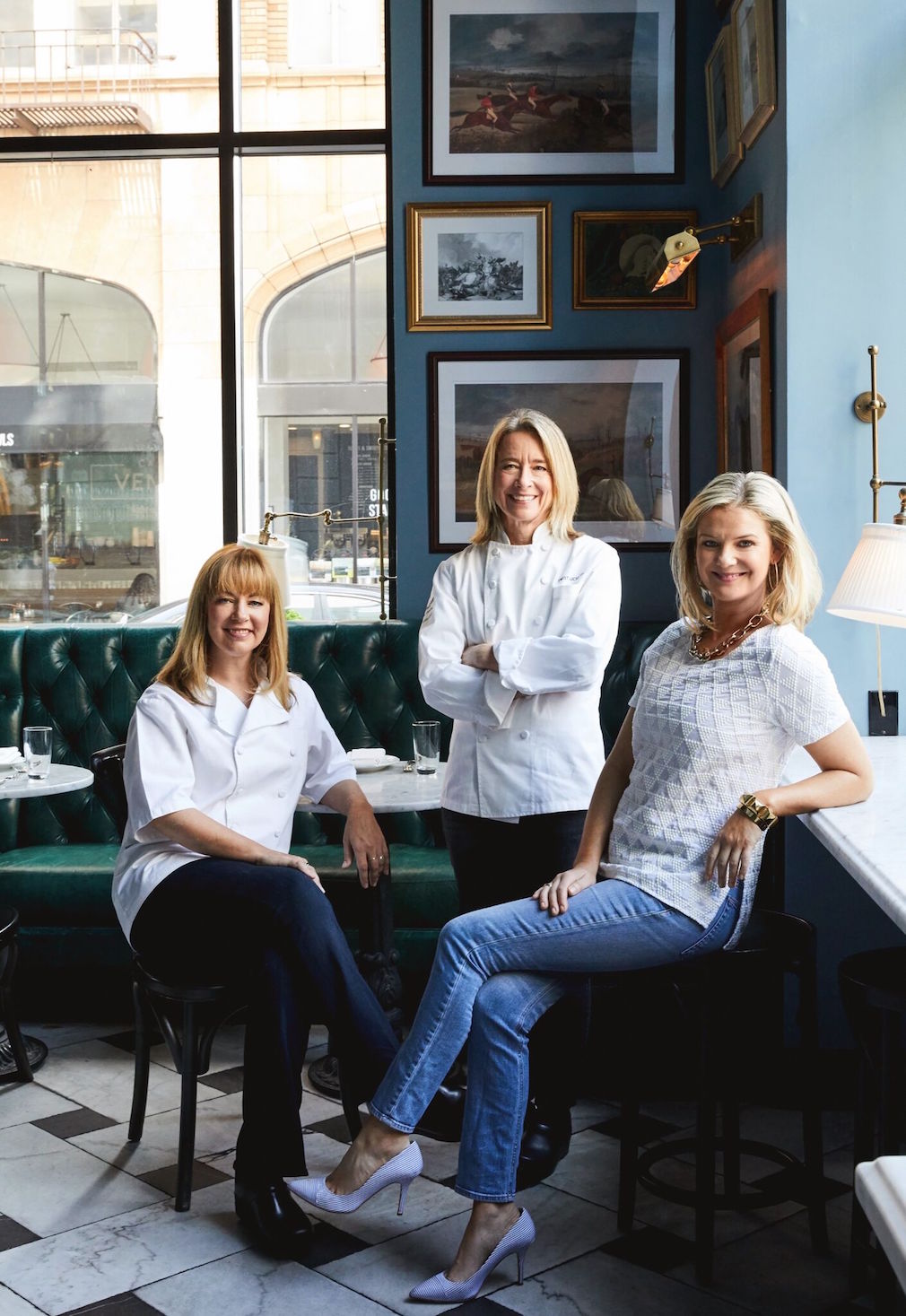
Photo Credit: Aubrie Pick
Unless you’re a total San Francisco food nerd, you might not recognize the names Anna Weinberg, Jennifer Puccio, and Emily Luchetti. However, if you dine out in San Francisco, you’ve definitely been to one of their restaurants. The trio is behind several of the city’s most popular eateries: Marlowe, Park Tavern, The Cavalier, Marianne’s, Leo’s Oyster Bar, and coming later this spring, Petit Marlowe. In only seven short years, Weinberg, Puccio, and Luchetti have positioned themselves as one of the Bay Area restaurant industry’s most powerful empire builders. Just as each of their restaurants has a distinct personality, so do the women.
Weinberg, a New Zealand native and the co-owner and managing partner, is the life of the party—a fast-talking, infectiously energetic, slightly mischievous front of the house force. Puccio, originally from the East Coast and executive chef, is thoughtful, reserved, and creative—an inspiring back-of-house leader. Luchetti, a national pastry legend and CPO, Chief Pastry Officer, is the sage dessert whisperer—a quiet, wise, and supportive sprite whose purse is always filled with a bag of delicious treats. All three women are blonde and whip-smart. Together, along with James Nicholas, the managing partner who oversees finances, the trio make up the Big Night Restaurant Group.
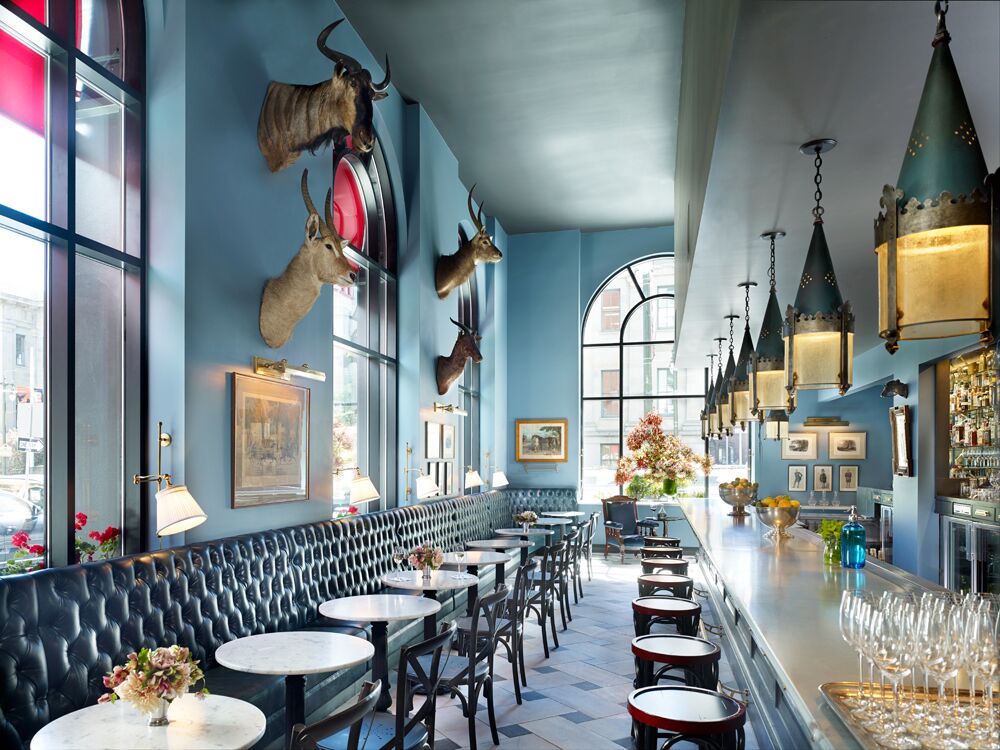
Photo Credit: Eric Wolfinger
While each restaurant has its individual makeup—Marlowe is the neighborhood bistro that caters to SOMA’s tech crowd, Park Tavern is an upscale American brasserie in North Beach that is ideal for celebrations, The Cavalier is a stylish British gastropub adjacent to the trendy Hotel Zetta downtown, Marianne’s is a 1970s-themed not-so-secret secret bar at the back of The Cavalier, and Leo’s Oyster Bar is a splashy Financial District seafood haven that is a place to see and be seen—they all have an unmistakable je ne sais quoi. Walk into any of Big Night’s ventures and you can’t help but notice a buzz in the air, as if the restaurant itself is alive and you’ve stepped into the most exciting party in San Francisco.
That’s not by accident; Weinberg is meticulous in crafting the ideal restaurant atmosphere. “The first thing I say when we hire a host is ‘Your job is to make sure when somebody walks in the door they feel like they’ve arrived at the best party in town’,” Weinberg told Haute Living on a recent sunny afternoon from the newly remodeled Marianne’s. “You have to create the atmosphere and the energy that somebody’s arrived at your party and this is where they should be.” Big Night also has a unique relationship to the city. With each opening, the restaurant instantly feels like it’s been there forever; it magically becomes a part of San Francisco’s fabric. Now when you think of the iconic Washington Square Park in North Beach, you can’t envision it without Park Tavern in the background—even though it’s only been there for six years. “When people go out to eat, they sometimes want to go to the new, hot, trendy place,” Puccio says, “but they also want to go to the place that feels like it’s been there forever, whether it has or it hasn’t.”
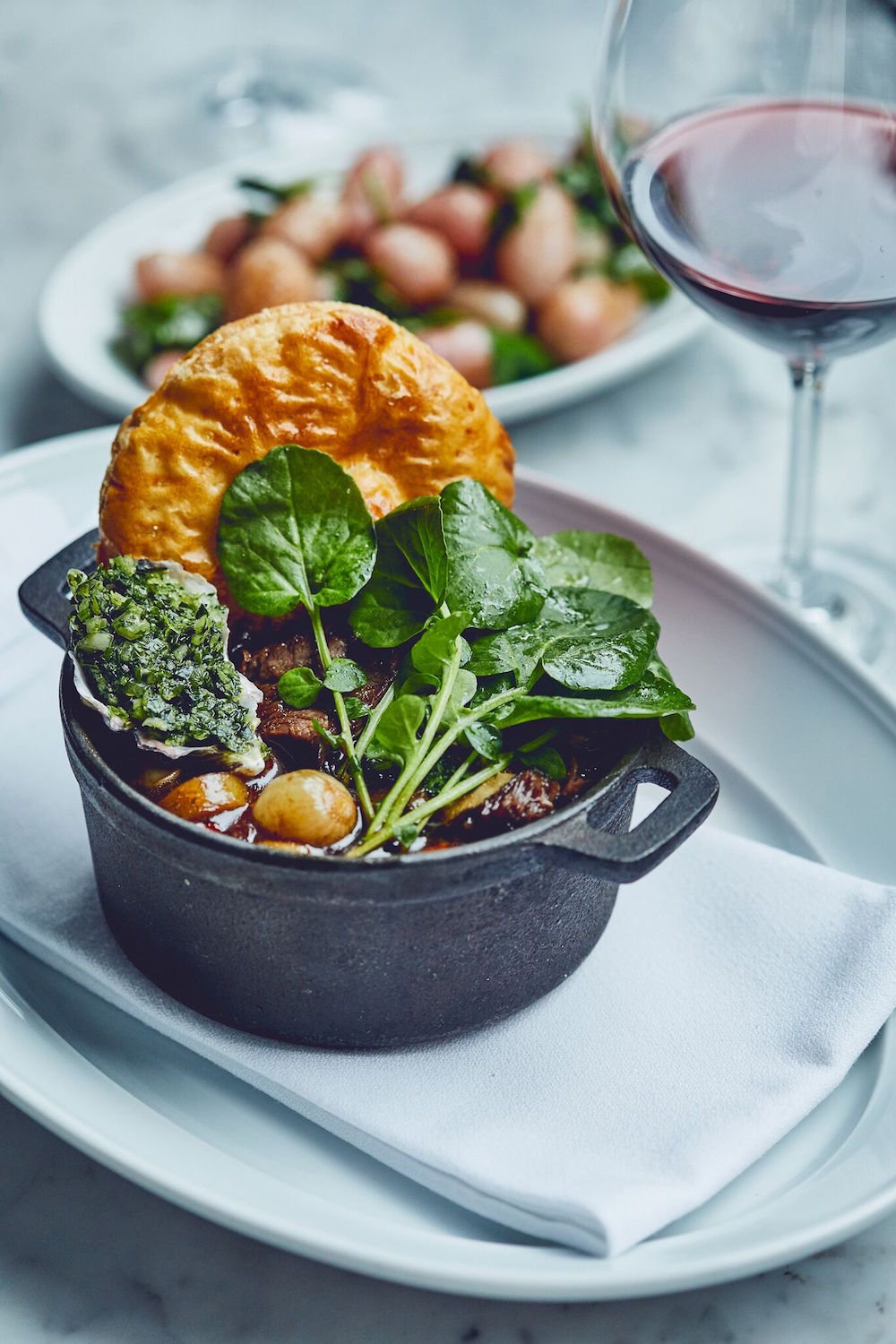
Photo Credit: Aubrie Pick
Another reason diners keep coming back to Big Night’s establishments? The sensational food. Puccio’s Marlowe burger has such a cult following that, for a time, there was a pop-up restaurant devoted just to it. However, it has since closed and the burger is now served at Marlowe, Park Tavern, and The Cavalier. Ground lamb is added to the beef mixture which gives the patty a rich earthiness, and a tangy horseradish aioli is slathered on both sides of the bun to ensure that there is plenty of moisture. The accoutrements are cheddar cheese and bacon along with caramelized onions, which provide a savory sweetness. Perfectly crisp fries are served alongside the Marlowe burger making it sheer cheeseburger bliss. Puccio’s other signature dishes include Park Tavern’s smoked deviled eggs with bacon, pickled jalepeño, and chives (hands down, no questions asked: the best deviled eggs in San Francisco); Marlowe’s crispy Brussels sprout chips—delectable lightly fried Brussels sprout leaves with lemon and sea salt; and The Cavalier’s hen egg hollandaise that’s served in an egg shell with ham-and-cheese soldiers for dipping. “I’m trying to strike a balance in the kitchen like we do with our service and everything else, where people can always count on perhaps five dishes on the menu that we’re not going to change,” Puccio says. “Then the rest of it, we do seasonal changes.”
Multiple restaurants with electric atmosphere, impeccable service, and tasty food don’t go unnoticed by the industry. All four of the eateries have earned three stars from the San Francisco Chronicle critic, Michael Bauer; Park Tavern and The Cavalier were James Beard Award semifinalists for best new restaurant in 2012 and 2014 respectively; Leo’s was nominated for the James Beard best restaurant design award just this year. With such a series of smash hits, you’d think that the Big Night ladies carefully planned each restaurant—yet that’s not the case.
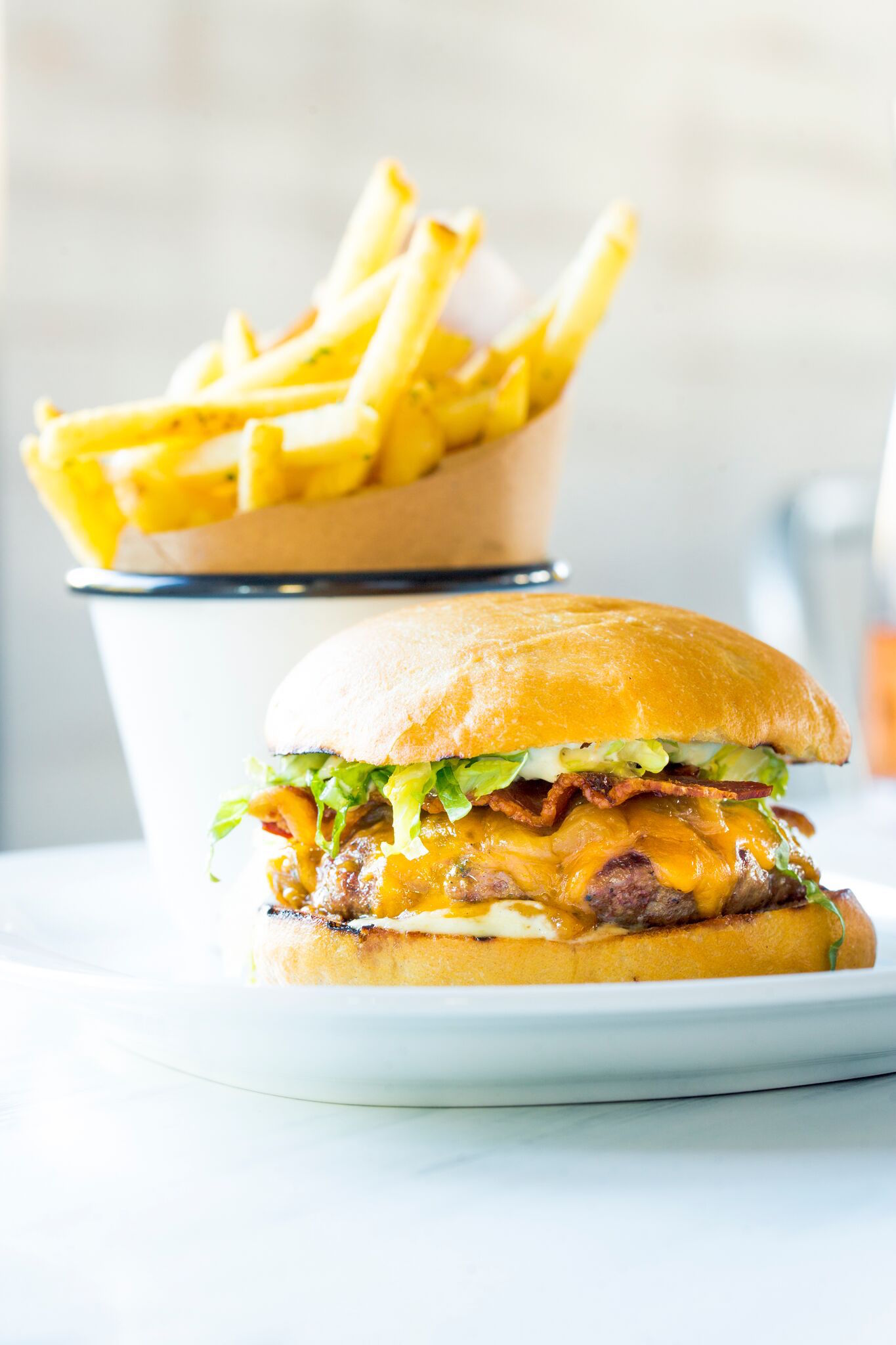
Photo Credit: Eric WolfingerIn 2010, two years after opening her first restaurant, Weinberg had to make a difficult decision. South Food & Wine Bar, a SOMA eatery that focused on the cuisine of her native New Zealand and Australia, was failing. She closed South, but with plans to transform the space into something new, delicious, and profitable. After experiencing a memorable meal at Cortez (a hotel restaurant near Union Square which is now closed) Weinberg reached out to the chef, Puccio, on a whim. “As we were winding South down and figuring out what the next move was, I still believed in the space, somebody took me to dinner at Cortez, where Jenn was cooking. I was completely blown away by the food. When I read it closed, I was like ‘yes!’ and I felt quite guilty. It was a horrible thing to be happy about another restaurant closing,” Weinberg reminisces. “I was like ‘I wonder where that chef is,’ and managed to stalk her, find her, track her down, and propose that we start working together to see if we like working together, if we had a similar philosophy, and that was kind of how Marlowe was born. It was pretty organic, really. I sort of started creating the space, she started creating the food, and Marlowe just all worked.”
When Mr. Bauer called to fact-check details on the burger, it put the two women in a tailspin. “The thing with fact checking is you know they’re fact checking, so you know they’ve had it, but you don’t know if that’s a good thing or a bad thing,” Luchetti explains. For Marlowe it was more than a good thing—Bauer ended up posting a rave review of the burger saying it was one of the best burgers he had tasted in a long time. “I got to work the next morning and there was a line. I thought it was a protest for Michael Savage, who was a conservative commentator at Clear Channel next door, but it wasn’t; it was people waiting for us to open to get the burger,” Weinberg remembers.
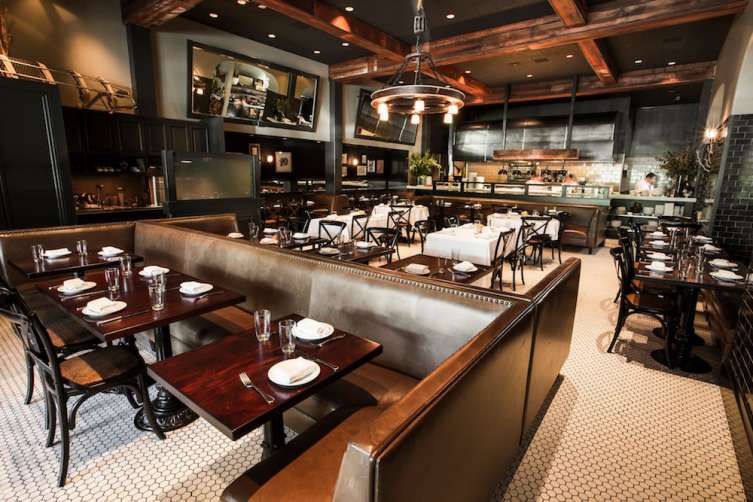
Photo Credit: Eric Wolfinger
The trio firmly believe in the importance of reviews and that the anonymity of the reviewer doesn’t matter—because as Weinberg puts it “you can’t remake the soup, right? If the soup’s shit, it’s shit. What I love about the review process is the finite amount of time it gives you to get everything kind of perfect,” Weinberg says. “I love the excitement of it with the staff. You’ve got 30 days to make sure everybody’s completely trained up and it gives you a bar. It gives you something to shoot for, but if there was ever a girl or a guy on our door that missed Mr. Bauer or anyone else important, they would be fired the next day.” To ensure that staff remain at the top of their game, they are rigorously trained, but not micromanaged—and everyone is considered family. “You’re empowering people to do their jobs and you don’t have to be there constantly looking down over their shoulder, because if you are, they’re not doing their job,” Luchetti says. “So you just need to go and be able to check in on them and make sure you’re there and you support them.” As Puccio puts it, “We’ve all drunk the Kool Aid. When you feel like you’re part of the family and you’re proud of what you do, you’re happy with what you do. And there is really—I don’t want to say strict—but there are systems that are in place that are good systems for hospitality and service in food that are very high quality, and people are expected to maintain those. But most people do because they want to be there.”
One person who wanted to be a part of Weinberg and Puccio’s world? Luchetti. After serving as the executive pastry chef at Farallon from 1997-2014 and Waterbar from 2008-2014, she was in need of a change. “I actually stalked these ladies and said, ‘I want to come work with you. Can I?’ I wanted to work with a restaurant group where people were coming more often than a real special occasion, where the price point was a little bit less and people were using it more, it was part of their day-to-day life. Also, working with guys for so many years, I really wanted to work with women,” Luchetti says. When working with other women, the three feel the rapport is easier and there is more sense of trust and collaboration.
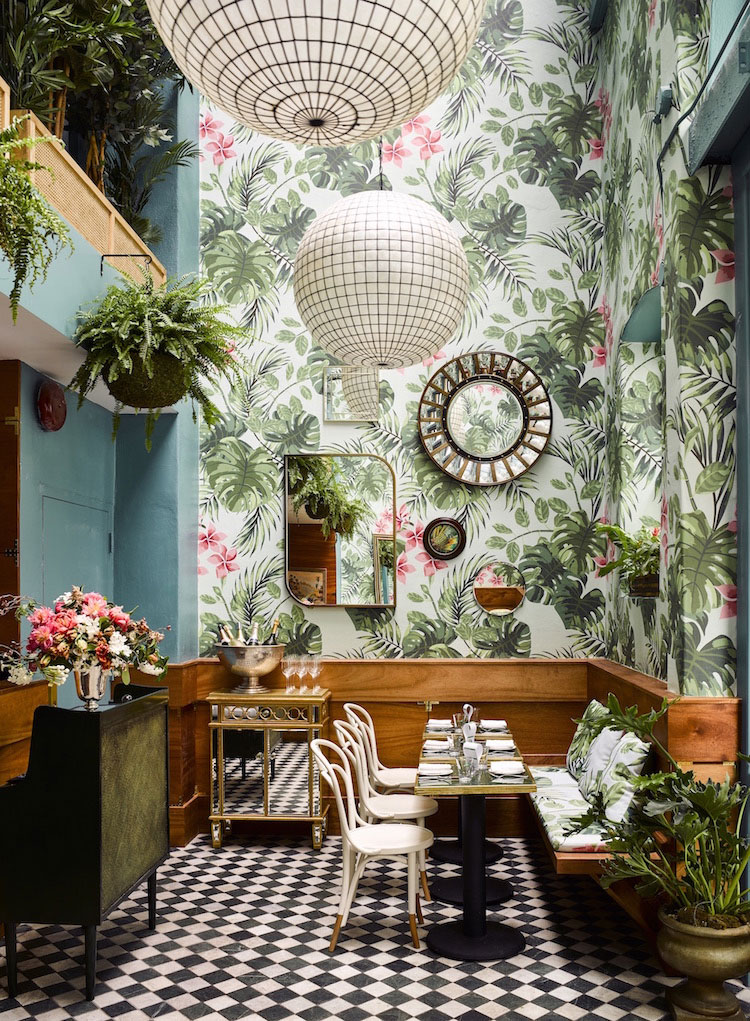
Photo Credit: Douglas Friedman
Despite the fact that the restaurant industry is traditionally an old boy’s club, none of the women have ever felt the wrath of a discriminatory owner or chef. Or to put it better, none of them could stand to work for a disrespectful or emotionally abusive boss. As Luchetti explains it, “I’ve always put myself in surroundings where I was treated fairly. And if I wasn’t, I left and went and found a place that I was.” Puccio agrees completely with her pastry chef. “I’ve never put myself in a situation where I wasn’t being treated fairly and being respected for the work that I was doing, or being chastised for the work that I wasn’t doing,” Puccio says.
While the ladies would love to serve as mentors to young women who are coming up in the restaurant industry, they have noticed a concerning lack of females making their way through the ranks in San Francisco. “I would love to have more women in the kitchen,” Weinberg says. “They’re just not coming through.” Luchetti confirms, “They’re not. They’re just not coming into the business.” Like many restaurateurs and chefs, Puccio cites SF’s extreme cost of living for the lack of women in the industry. “Women aren’t coming through—specifically not in San Francisco. If you’re paying two grand for a room in a house? Working for $15 an hour? Not a ton of people that are willing or able to do that.” The exorbitant cost of rent combined with SF’s minimum wage and healthcare requirements make it an incredibly difficult time to be a restaurateur. Not only are they not able to find women, but good hard-working employees in general. “If I really thought about it and I was like, let’s start again today, I wouldn’t do it,” Weinberg says slowly thinking through her words for the first time all afternoon. “I would go somewhere else. It’s prohibitively expensive to do business here. We’re lucky we already have a foothold.”
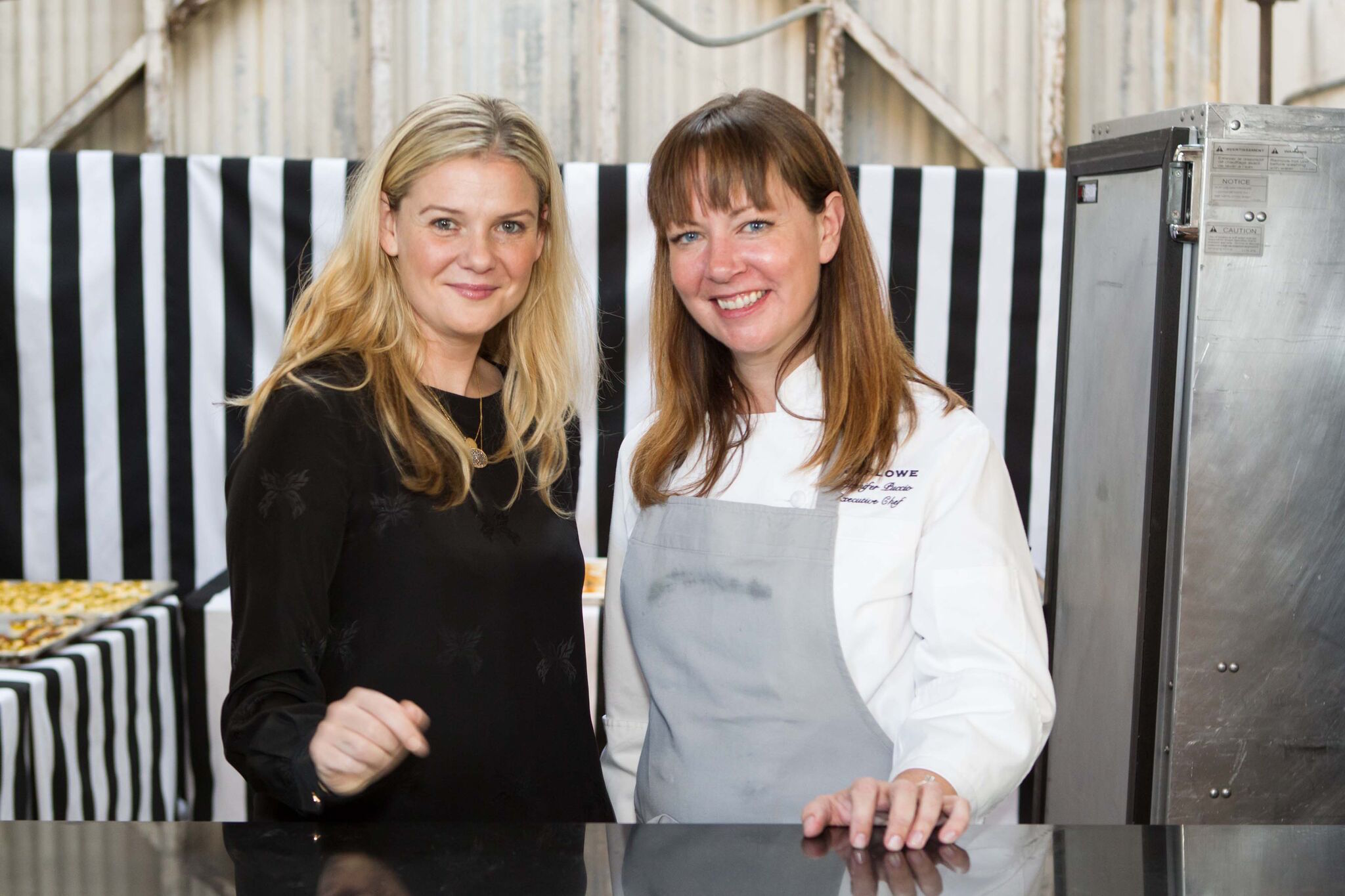
Photo Credit: Drew Altizer
It seems Big Night Restaurant Group has more than a foothold, but a winning formula for one smash hit after another. Currently, the team is frenetically preparing for the opening of their sixth restaurant Petit Marlowe, due later this spring. They have gutted star sommelier Mark Bright’s old wine bar Les Clos, and will turn it into a French bistro and oysterette. “Petit Marlowe is a return to the original philosophy of the first Marlowe, which was much smaller,” Weinberg explains. There is no gas range in the kitchen, so Puccio is getting creative with a steamer, convection oven, and a couple of tabletop burners. There will be raclette, beautiful salads, composed raw bar plates, a cheese program, and artisanal charcuterie. The team, along with Big Night’s creative director Jake Mogelson, took a week-long trip to Paris to scour the wine bars for food inspiration and flea markets for vintage decor items.
Do they have plans to open more eateries after Petit Marlowe? They can’t say—it all depends on if Weinberg finds a space that speaks to her. “I’m never looking. What will happen is I’ll see a space and I’ll think, ‘Oh god.’ I always have three or four concepts kind of marinating away in my head and they just seem to be looking for homes sometimes, and then homes present themselves.”
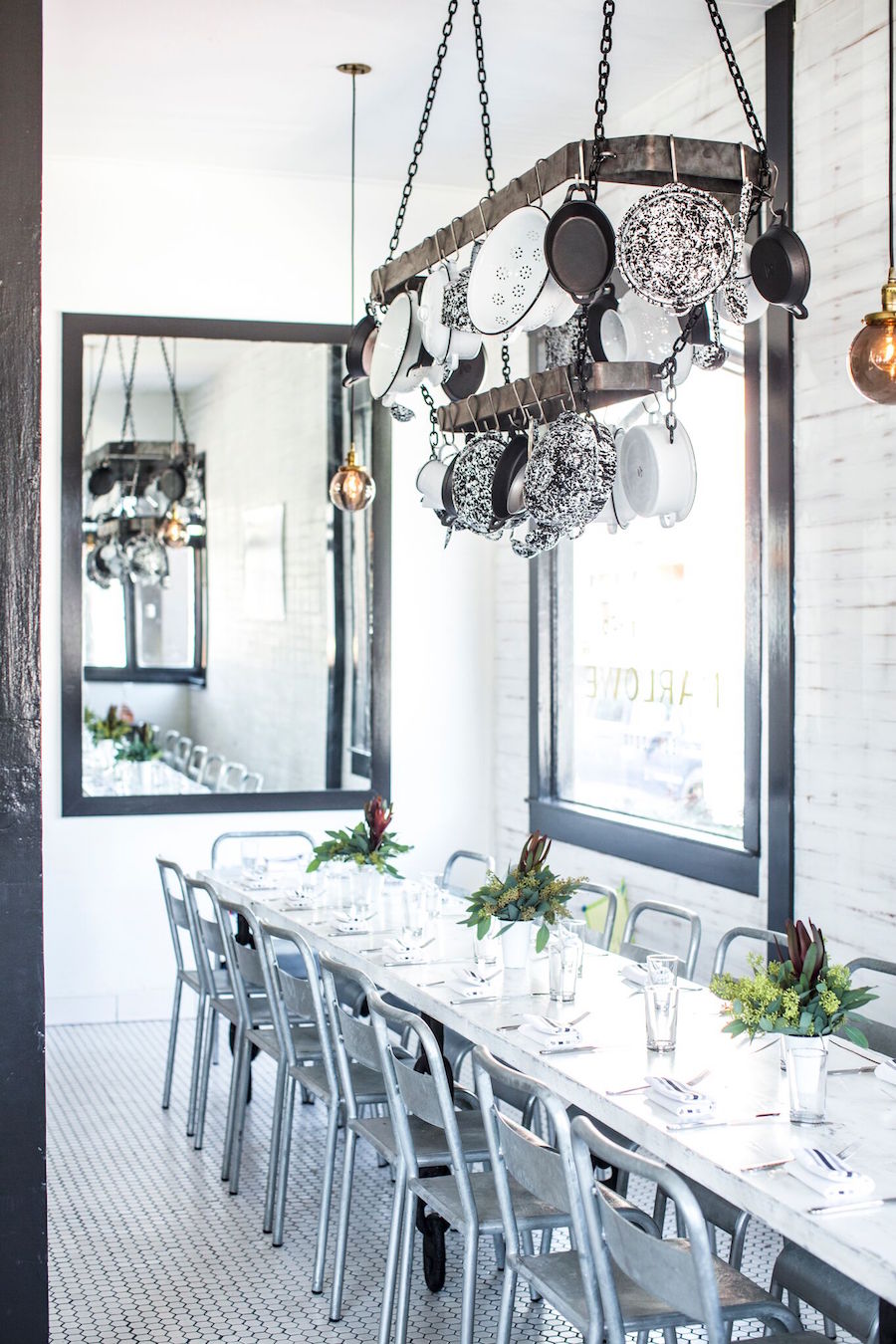
Photo Credit: Eric Wolfinger
While no space has caught her eye yet, they are thinking of expanding to Los Angeles. “We would love to do a Leo’s Oyster Bar somewhere else. That’s certainly not a secret,” Weinberg says. “It doesn’t feel city-specific and what I love about Leo’s is it feels like a special occasion restaurant every night. People are there to celebrate, people are dressed really well there, and I just feel like a special-occasion restaurant always translates. So we might want to do a Leo’s at a hotel in Los Angeles.”
The wheels are constantly turning and one thing is for certain: Big Night shows no signs of slowing down. There are more great things to come and San Franciscans are along for the wild ride. “We seemed to have found a pace that actually works for us. Everybody else has to just kind of keep up,” Weinberg says with a smile. “When you stumble upon something that works really well, you just roll with it.”







